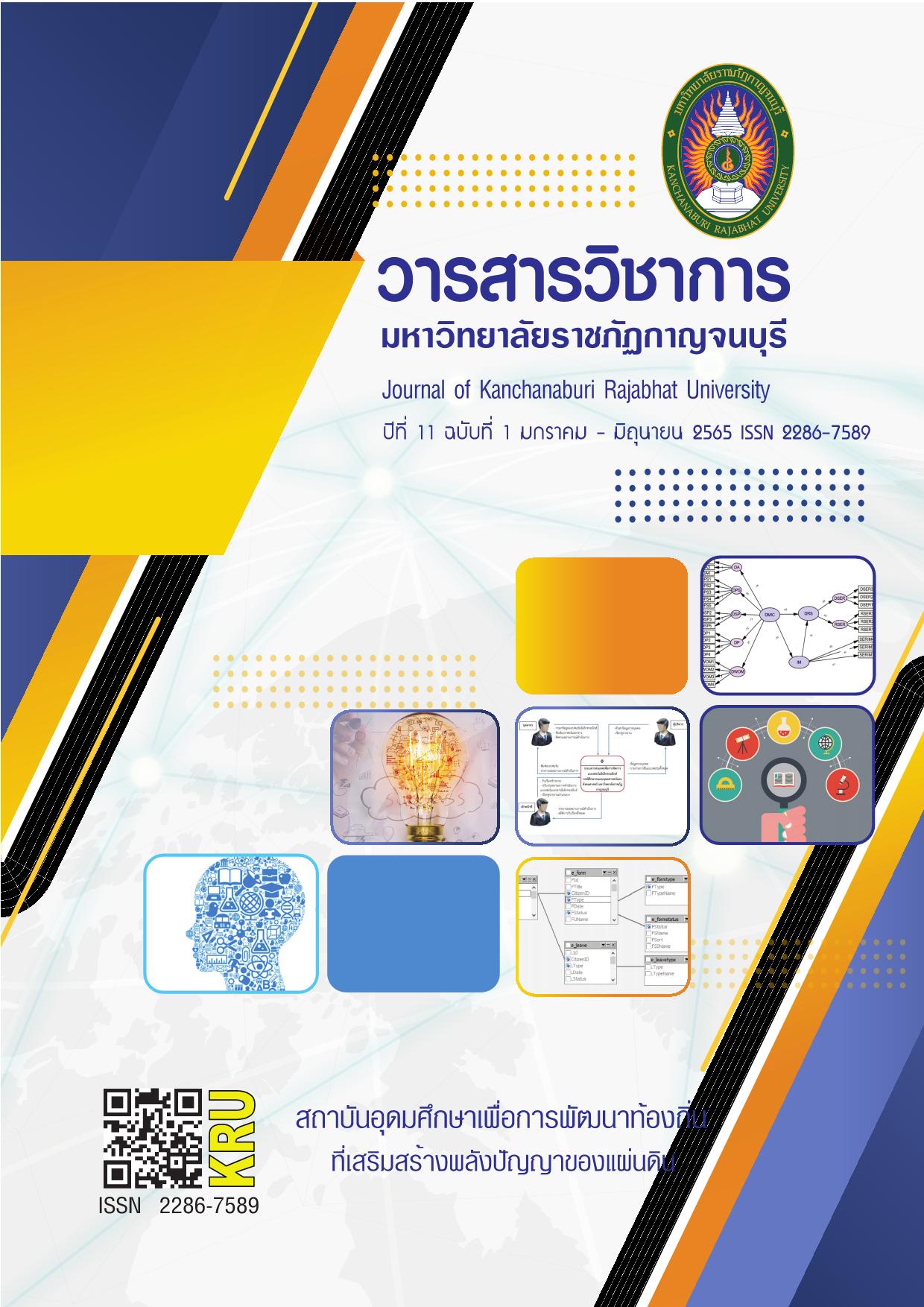กลยุทธ์การบริหารงานวิชาการโดยใช้เทคโนโลยีสารสนเทศและการสื่อสารของโรงเรียนประถมศึกษาขนาดเล็ก สังกัดสำนักงานคณะกรรมการการศึกษาขั้นพื้นฐาน STRATEGY FOR ACADEMIC ADMINISTRATION USING INFORMATION AND COMMUNICATION TECHNOLOGY OF SMALL PRIMARY SCHOOLS UNDER THE SUPERVISION OF THE OFFICE OF PRIMARY EDUCATION COMMISSION.
Main Article Content
Abstract
The aims of this research were: 1) To develop the strategies for academic administration using information and communication technology for small primary schools under the supervision of the Office of Primary Education Commission; 2) To certify the strategies for academic administration using information and communication technology for small primary schools under the supervision of the Office of Primary Education Commission. Mixed methods were used in this research. The research process was divided into 2 phases. Phase 1 included the development of strategies for academic administration using information and communication technology. The informants were 6 experts derived by purposive sampling. The research instruments were a document analysis form and a semi-structured interview. The sample group comprised 754 school administrators and teachers derived by stratified random sampling. The research instrument was a questionnaire. The data were analyzed by frequency, percentage, mean, standard deviation and modified priority needs index; 3) To analyze strengths, weaknesses, opportunities, and threats of academic administration using information and communication technology. The research instruments were a SWOT analysis and TOWS Matrix forms. The data were analyzed by content analysis; 4) To draft the strategies for academic administration using information and communication technology. The research instrument was a document record. The data were analyzed by content analysis. Phase 2 included the certification of strategies for academic administration using information and communication technology for small schools under the supervision of the Office of Primary Education Commission. This phase comprised the following: 1) Investigating and evaluating correctness, suitability and feasibility of strategy application and utilization through a connoisseurship seminar of 7 experts derived by purposive sampling. The research instruments were a connoisseurship seminar manual and an evaluation form of correctness, suitability, and feasibility of strategy application and utilization. The data were analyzed by mean, standard deviation, and content analysis; 2) Studying the guidelines for strategy implementation by organizing a policy meeting. The informants were 15 stakeholders. The research instruments were meeting agendas and the draft of strategies for academic administration using information and communication technology. The data were analyzed by content analysis.
The research results showed that:
1) The strategies for academic administration using information and communication technology for small schools under the supervision of the Office of Primary Education Commission comprised 5 strategies: 1) pushing the establishment of modern information and communication technology learning resources; 2) strengthening the competency in assessment and evaluation using information and communication technology; 3) developing a teaching and learning model using information and communication technology; 4) driving the supervision of teaching using information and communication technology; and 5) changing the development of educational media, innovation, and technology using information and communication technology. These strategies comprised twelve sub-strategies and forty one procedures.
2) Overall, the developed strategies for academic administration using information and communication for small schools under the supervision of the Office of Primary Education Commission were correct, suitable, feasible, and usable at the highest level.
Article Details

This work is licensed under a Creative Commons Attribution-NonCommercial-NoDerivatives 4.0 International License.
References
คมกริช ไชยทองศรี. (2561). การบริหารจัดการการใช้เทคโนโลยีสารสนเทศและการสื่อสารในโรงเรียนต้นแบบ
ICT เพื่อการเรียนรู้ สำนักงานคณะกรรมการศึกษาขั้นพื้นฐาน : พหุกรณีศึกษา. วิทยานิพนธ์ครุศาสตร
ดุษฎีบัณฑิต สาขาภาวะผู้นำทางการบริหารการศึกษา บัณฑิตวิทยาลัย มหาวิทยาราชภัฏสกลนคร.
จิติมา วรรณศรี. (2557). การบริหารงานวิชาการในสถานศึกษา. พิษณุโลก: รัตนสุวรรณการพิมพ์ 3.
สำนักงานคณะกรรมการดิจิทัลเพื่อเศรษฐกิจและสังคมแห่งชาติ กระทรวงดิจิทัลเพื่อเศรษฐกิจและสังคม. (2562).
นโยบาย และแผนระดับชาติว่าด้วยการพัฒนาดิจิทัลเพื่อเศรษฐกิจและสังคม (พ.ศ.2561 – 2580). กรุงเทพฯ: ผู้แต่ง.
สำนักงานบริหารงานการมัธยมศึกษาตอนปลาย. (2553). การเรียนรู้ดิจิทัลเทคโนโลยีโรงเรียนมาตรฐานสากล.
กรุงเทพฯ: ชุมนุมสหกรณ์การเกษตรแห่งประเทศไทย.
สำนักงานปลัดกระทรวงศึกษาธิการ กระทรวงศึกษาธิการ. (2559). แผนพัฒนาการศึกษาของกระทรวงศึกษาธิการ
ฉบับที่ 12 (พ.ศ.2560-2564). กรุงเทพฯ: สำนักนโยบายและยุทธศาสตร์.
สำนักงานเลขาธิการสภาการศึกษา กระทรวงศึกษาธิการ. (2560). แผนการศึกษาแห่งชาติ (พ.ศ.2560-2579).
กรุงเทพฯ: สำนักนโยบายและยุทธศาสตร์.
สุกัญญา แช่มช้อย. (2562). การบริหารสถานศึกษาในยุคดิจิทัล (พิมพ์ครั้งที่ 2). กรุงเทพฯ: จุฬาลงกรณ์มหาวิทยาลัย.
สุนีย์ ชัยสุขสังข์. (2557). กลยุทธ์การบริหารวิชาการเพื่อเสริมสร้างทักษะแห่งศตวรรษที่ 21 ของนักเรียน
ในโรงเรียนเอกชนทางเลือก. วิทยานิพนธ์ปรัชญาครุศาสตรดุษฎีบัณฑิต สาขาวิชาการบริหารการศึกษา
บัณฑิตวิทยาลัย จุฬาลงกรณ์มหาวิทยาลัย.
สุวิมล ติรกานันท์. (2555). ระเบียบวิธีการวิจัยทาง ทางสังคมศาสตร์: แนวทางสู่การปฏิบัติ (พิมพ์ครั้งที่ 10).
กรุงเทพฯ: จุฬาลงกรณ์มหาวิทยาลัย.
เสาวภา นิสภโกมล. (2558). กลยุทธ์การบริหารงานวิชาการโรงเรียนมัธยมศึกษาตามแนวคิดการพัฒนาพลเมือง
คุณภาพ. วิทยานิพนธ์ครุศาสตรดุษฎีบัณฑิต สาขาวิชาการบริหารการศึกษา บัณฑิตวิทยาลัย
จุฬาลงกรณ์มหาวิทยาลัย.


